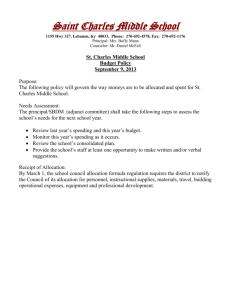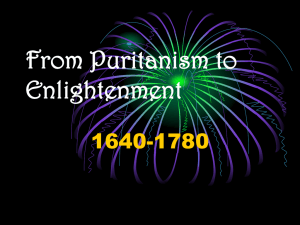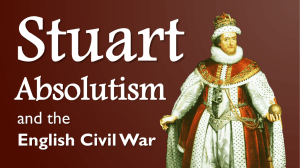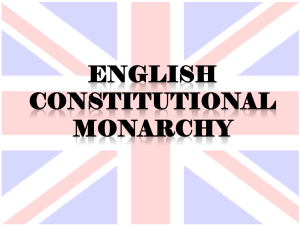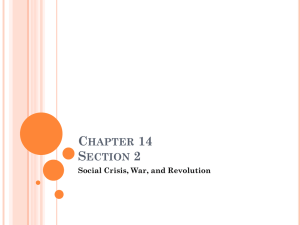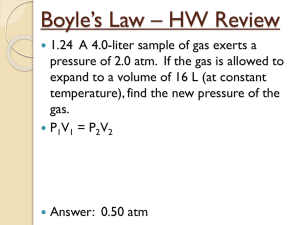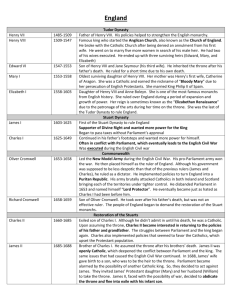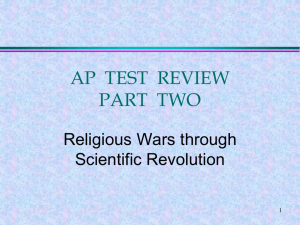key to mid-unit quiz
advertisement
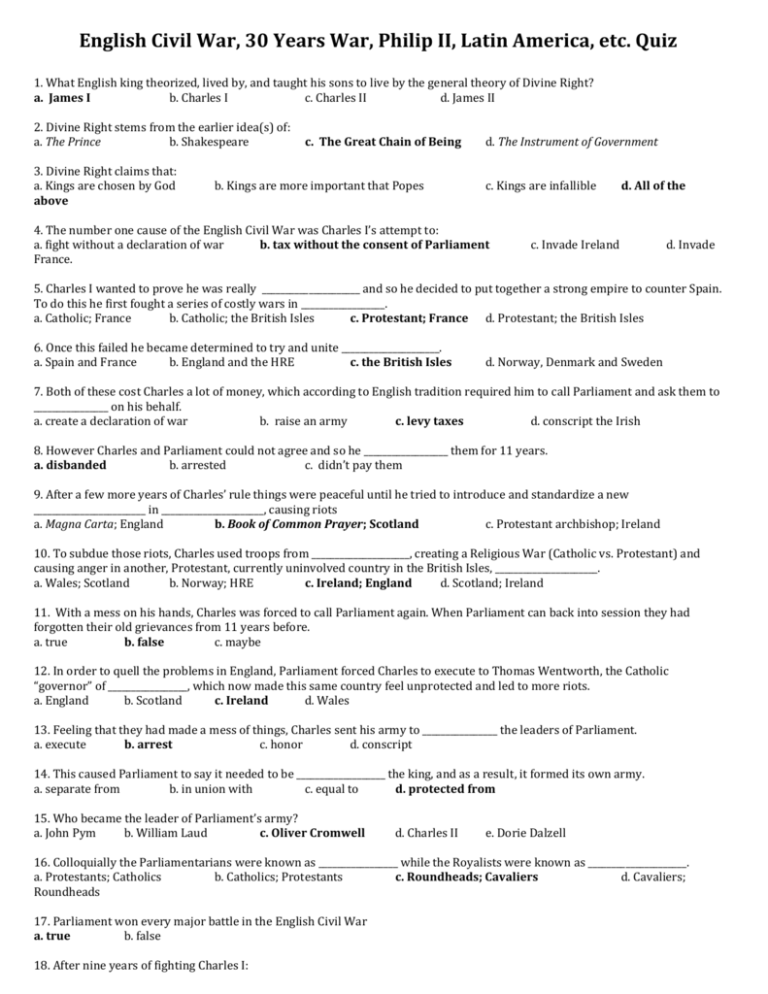
English Civil War, 30 Years War, Philip II, Latin America, etc. Quiz 1. What English king theorized, lived by, and taught his sons to live by the general theory of Divine Right? a. James I b. Charles I c. Charles II d. James II 2. Divine Right stems from the earlier idea(s) of: a. The Prince b. Shakespeare 3. Divine Right claims that: a. Kings are chosen by God above c. The Great Chain of Being b. Kings are more important that Popes d. The Instrument of Government c. Kings are infallible 4. The number one cause of the English Civil War was Charles I’s attempt to: a. fight without a declaration of war b. tax without the consent of Parliament France. d. All of the c. Invade Ireland d. Invade 5. Charles I wanted to prove he was really _____________________ and so he decided to put together a strong empire to counter Spain. To do this he first fought a series of costly wars in __________________. a. Catholic; France b. Catholic; the British Isles c. Protestant; France d. Protestant; the British Isles 6. Once this failed he became determined to try and unite _____________________. a. Spain and France b. England and the HRE c. the British Isles d. Norway, Denmark and Sweden 7. Both of these cost Charles a lot of money, which according to English tradition required him to call Parliament and ask them to ________________ on his behalf. a. create a declaration of war b. raise an army c. levy taxes d. conscript the Irish 8. However Charles and Parliament could not agree and so he __________________ them for 11 years. a. disbanded b. arrested c. didn’t pay them 9. After a few more years of Charles’ rule things were peaceful until he tried to introduce and standardize a new ________________________ in ______________________, causing riots a. Magna Carta; England b. Book of Common Prayer; Scotland c. Protestant archbishop; Ireland 10. To subdue those riots, Charles used troops from _____________________, creating a Religious War (Catholic vs. Protestant) and causing anger in another, Protestant, currently uninvolved country in the British Isles, ______________________. a. Wales; Scotland b. Norway; HRE c. Ireland; England d. Scotland; Ireland 11. With a mess on his hands, Charles was forced to call Parliament again. When Parliament can back into session they had forgotten their old grievances from 11 years before. a. true b. false c. maybe 12. In order to quell the problems in England, Parliament forced Charles to execute to Thomas Wentworth, the Catholic “governor” of _________________, which now made this same country feel unprotected and led to more riots. a. England b. Scotland c. Ireland d. Wales 13. Feeling that they had made a mess of things, Charles sent his army to ________________ the leaders of Parliament. a. execute b. arrest c. honor d. conscript 14. This caused Parliament to say it needed to be ___________________ the king, and as a result, it formed its own army. a. separate from b. in union with c. equal to d. protected from 15. Who became the leader of Parliament’s army? a. John Pym b. William Laud c. Oliver Cromwell d. Charles II e. Dorie Dalzell 16. Colloquially the Parliamentarians were known as _________________ while the Royalists were known as _____________________. a. Protestants; Catholics b. Catholics; Protestants c. Roundheads; Cavaliers d. Cavaliers; Roundheads 17. Parliament won every major battle in the English Civil War a. true b. false 18. After nine years of fighting Charles I: a. was caught, tried and executed battle b. fled to France c. Tried to enlist the help of Spain d. died in 19. After 11 years of having a republic with a Lord Protector, the English asked Charles II to become king in a move known as: a. The Gunpowder Plot b. The Glorious Revolution c. The Return of the King d. The Restoration 20. After looking at the events of the English Civil War, Thomas Hobbes concluded it was best people be governed by: a. a republic b. a democracy c. a fundamentalist government d. an absolute monarchy 21. After James II tried to make England Catholic again, Parliament invited his daughter and son-in-law to become King and Queen of England in an event known as: a. The Gunpowder Plot b. The Glorious Revolution c. The Return of the King d. The Restoration 22. Before William and Mary were crowned monarchs, Parliament forced them to sign into law the: a. Magna Carta b. Petition to the king c. Leviathan d. English Bill of Rights 23. This document (question #22) is drastically different from the U.S. Bill of Rights. a. true b. false c. maybe 24. Why did the founding fathers of the U.S. rebel against England in 1776? a. They wanted to get rid of an oppressive country b. They thought their natural rights as Englishmen had been denied. 25. The Thirty Years War began with: a. the burning of Jan Hus b. the Diet of Worms c. the Augsburg Confession d. The Defenestration of Prague 26. The Thirty Years War was originally based around __________________ but became a war based around ______________ and creating and maintaining a balance of power. a. politics; religion b. religion; politics c natural rights; divine right d. divine right; natural rights 27. The Thirty Years War had little to no impact on the population of the HRE. a. true b. false 28. What ended the Thirty Years War? a. Peace of Augsburg b. Peace of Versailles c. Peace of Ghent d. Peace of Westphalia 29. The idea that no country should become too powerful to conquer the rest of Europe is known as: a. Political Systems Spectrum. b. Balance of Power c. Structure of Versailles. d. Viceroy Check System. 30. Spain’s prominence as a leader in the Age of Exploration can generally be boiled down to a desire to prove it was: a. an absolute monarchy. b. a Catholic country c. a power in Europe. d. a united country 31. The Treaty of Tordesilla “split” the world in half for what two powers to explore and conquer? a. England & France. b. Holy Roman Empire & Sweden. c. Italy & Netherlands. 32. Which of the following conflicts did not erode Spanish power? a. Thirty Years War. b. Spanish Armada. c. Dutch Wars of Religion. d. Spain & Portugal. d. Reconquista of Iberia 33. ________ is the term used for someone born in Iberia who immigrated to Latin America; whereas _______ is the term used for someone of Iberian descent born in Latin America a. Mestizo; Native American b. Peninsular; Creole c. Creole; Peninsular d. Native American; Mestizo 34. Spain kept its economy going during the early colonial period by taxing how much of all goods from the New World? a. One fifth. b. One quarter. c. One third. d. One half. 35. The idea that all people should act in an upstanding manner, similar to the ideas of chivalry, defending one’s reputation and family is known in Latin America as: a. the caste system b. the peonage system c. the encomienda system d. the honor system 36. One of the major problems with Latin American colonial government is that it was very: a. complicated. b. corrupt. c. revolutionary d. ecclesiastical 37. Spanish colonies in the new world relied exclusively on slave labor. a. true. b. false. 38. Hegemony is an example of: a. hard power. b. soft power.
